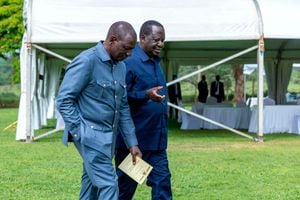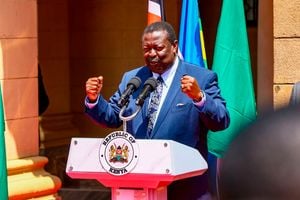
President William Ruto and Azimio la Umoja leader Raila Odinga.
At least five attempts to amend the Constitution have failed, with another campaign underway following a recent deal between President William Ruto and opposition leader Raila Odinga, 14 years after the promulgation of the 2010 Constitution.
The law has yet to be fully implemented, but the clamour for amendments has gained momentum, most recently as a result of dialogue between the ruling party and the opposition.
Following the ceasefire between President Ruto and Mr Odinga, their warring factions held crisis talks that resulted in the National Dialogue Committee (Nadco) report, which was endorsed by Parliament.
It's the latest attempt at constitutional change as the 10-member committee's report recommends appropriate constitutional, legal and policy reforms in five key areas.
These contentious issues are electoral justice and related matters; unresolved grievances, including the spiralling cost of living that fuelled the recent anti-government protests that saw youth demonstrators force the withdrawal of the 2024 Finance Bill, which contained a raft of unpopular taxes; implementation of the two-thirds gender rule; inclusivity in public appointments; and fidelity to political parties or coalitions.
Others are the entrenchment of funds in the constitution and the creation of the office of the leader of the official opposition and the office of the prime minister.
The creation of new executive positions to address the winner-take-all system blamed for conflict in every election cycle is a controversial constitutional amendment that has never seen the light of day in past futile attempts to amend the Constitution.
There have been numerous attempts to amend the Constitution through people's initiatives, starting with Okoa Kenya, Punguza mzigo, pesa mashinani, the Senate's proposed amendment and the Building Bridges Initiative (BBI).
The BBI constitutional reforms ahead of the 2022 elections, championed by then President Kenyatta and his preferred successor, Mr Odinga, were struck down by the Supreme Court.
The judges ruled that the president could not initiate constitutional changes through a popular initiative, putting the brakes on a crusade to create additional electoral districts and new executive positions, including that of prime minister.
Mr Odinga, the presidential candidate of the Azimio La Umoja One Kenya Coalition party, lost the presidential election to Dr Ruto of the United Democratic Alliance (UDA).
The two bitter rivals now find themselves allies in government. The president has appointed five of Mr Odinga's allies to the cabinet and is leading the former prime minister's campaign for the chairmanship of the African Union Commission (AUC).
Kenyans are yet to test the limits of the supreme law, which has seen some intense debates, especially on the doctrine of the basic structure, the system of governance and the creation of constituencies through the schedule.
Some of the thorny issues at play include the allocation of resources to the counties, with governors seeking to amend Article 203 of the Constitution on revenue sharing between the two levels of government.
Through the Council of Governors (CoG), then led by Governor Isaac Ruto, the counties sought to increase the shareable revenue percentage from a minimum of 15 percent to 30 percent of the latest audited revenue by the Auditor-General.
Mr Ruto led a seven-member committee selected by the county chiefs to spearhead the Pesa Mashinani initiative to push for more resources, among other issues affecting the devolved units.
Not to be left out, the Senate unveiled a nine-member committee to draw up a roadmap for its referendum, as senators sought to assert their authority and regain their clout in the wake of the incessant tussle for supremacy with the National Assembly.
Ten years ago, the Office of the Auditor-General appointed an eleven-member working group to conduct the socio-economic audit of the Constitution.
The National Assembly approved the establishment of the committee to provide the National Assembly with the necessary information and analysis to assist in the discharge of Parliament's oversight mandate.
The group, chaired by the then Auditor-General, Edward Ouko, was mandated, among other things, to assess the impact of the implementation of the Constitution on the country's economy and, in particular, its public finances.
A key objective of the task force was to make recommendations to the National Assembly on possible measures to enhance prudent management of the country's public resources.
The Coalition for Reforms and Democracy (CORD), led by opposition leader Raila Odinga, pushed to address the issue of winner-take-all in the purely presidential system.
However, it didn't get beyond the collection of signatures, which was rejected by the Independent Electoral and Boundaries Commission (IEBC) for failing to meet the threshold.
The Third Way Alliance, led by Ekuru Aukot, pushed to reduce the number of elective offices but failed to secure the support of at least 24 counties.
“Happy birthday @14 to the CoK 2010. Sadly, feckless leadership isn’t respecting it,” Aukot said on X, formerly Twitter.
Then came the christening of the handshake between President Uhuru Kenyatta and Mr Odinga after the contentious 2017 presidential election. They pushed for radical changes to the BBI initiative, which was struck down by the courts, including the creation of 70 new constituencies, the granting of sweeping powers to the presidency and the introduction of the office of prime minister and two deputies, as well as the office of official opposition.
But despite the clamour, the courts have scored some victories and remain the last line of defence for Wanjiku.
“This day presents a moment of reflection over the gains and shortfalls we have faced in implementing the Constitution... it is key that we evaluate the state of our leadership and how it affects the Kenya we want as contemplated in the Constitution,” Law Society of Kenya (LSK) President Faith Odhiambo said at the Kenya Christian Professionals Forum (KCPF) at Ufungamano House.
She called on Kenyans to remain vigilant to ensure that the outstanding fundamental provisions of the Constitution that remain dormant are activated and fully invoked.
“We must work together to bring the aspirations of the constitution on important matters to fruition, including the rule of law, the two thirds gender rule, integrity and accountability of leaders and the public service, judicial independence and oversight and electoral justice and reforms,” she appealed to Kenyans.
Ms Odhiambo, who has been at the forefront of calls for respect for the law, said the pain and sacrifice behind our constitution should guide Kenyans.
“Our current struggles reflect the very reasons for our fight. We must address these issues to mark the most of our new beginning. This is a special day for our nation and on such a day, I am beyond order to be part of this auspicious gathering of patriots,” the LSK president said with a powerful rendition of ‘Joy Rene King’s poem “We the people".
The constitution was midwifed by the late President Mwai Kibaki and Mr Odinga, then Prime Minister, after more than 20 years of post-independence struggle for a new law.
Muslims for Human Rights (Muhuri) says this constitution is a beacon of hope that embodies the aspirations of millions of Kenyans for a just, equitable and democratic society.
Executive Director Walid Kassim said that as the country commemorates Katiba Day, Kenyans should recommit themselves to the full implementation of the Constitution.
“We must collectively strive to uphold the rule of law, ensure the independence of our institutions and protect the rights of every citizen,” said Mr Kassim as he reflected on the journey of the supreme law.
He stressed, “The responsibility now lies with the administration of President William Ruto, who has so far failed to honour this sacred document. We urge President Ruto to have a ‘Damascus moment’ to realise the importance of upholding the constitution in its entirety, irrespective of personal or political disagreements with its provisions.”
Muhuri argues that the country's future depends on its ability to uphold the principles enshrined in the constitution.
“The onus is on us to bequeath a nation governed by the rule of law to the next generation. A nation where every Kenyan can live in dignity, free from fear, and with the assurance that their rights will be respected and upheld,” Mr Kassim urged.
Various civil society groups have called on the government to respect the law.
The latest threat to roll back gains, according to Githunguri MP Gathoni Wamuchomba, is the various attempts to restrict fundamental rights through the introduction of bills such as the Assembly and Demonstrations Bill, 2024, on picketing by Mbeere South MP Geoffrey Ruku.
She noted that the greatest achievement of the Constitution is the protection of human rights and respect for human dignity.
“This bill seeks to jail protestors for one year and fine them 100,000 for convening an assembly without notice and clearance by the police,” the MP said, warning that this proposed law contravenes Article 37 of the constitution and grants police full power to allow and licence demonstrations in writing.
“This is ruthless subversion of democracy through parliament. This bill is oppressive and a back door entry to dictatorship and should not be allowed to see the light of day.”









